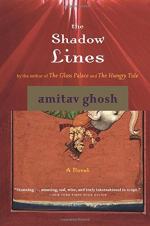|
This section contains 6,314 words (approx. 22 pages at 300 words per page) |

|
SOURCE: “Microstoria: Indian Nationalism's ‘Little Stories’ in Amitav Ghosh's The Shadow Lines,” in Journal of Commonwealth Literature, Vol. 35, No. 2, Fall, 2000, pp. 35–49.
In the following essay, Roy uses The Shadow Lines as an example of how local ties and community history can supersede the ideal of nationalism.
If imperialism is an “act of geographical violence through which virtually every space in the world is explored, charted, and finally brought under control,” the primacy of the cartographic impulse in the anti-imperialist imagination is quite understandable. Cultures of resistance are seen to “reclaim, rename and remap the land”1 in their move towards nationalist self-assertion. Amitav Ghosh's The Shadow Lines examines the relevance of nationalism's concern with geographical restoration in the context of a new borderless, global landscape.2 While acknowledging the contribution of nationalism in affirming the Indian people's identity during the Independence struggle, Ghosh attempts to fill up the gaps in...
|
This section contains 6,314 words (approx. 22 pages at 300 words per page) |

|


